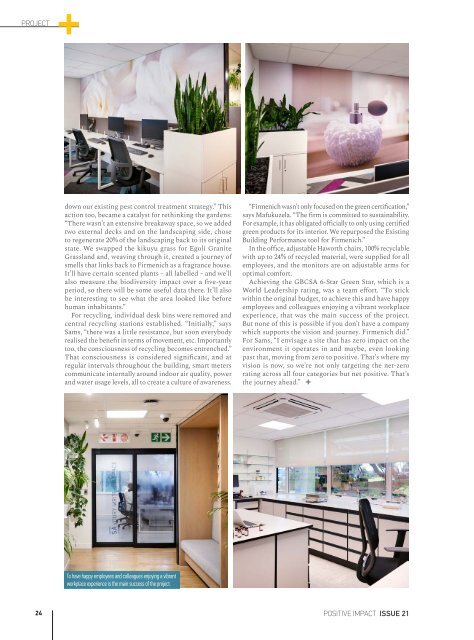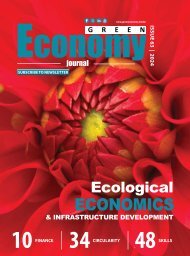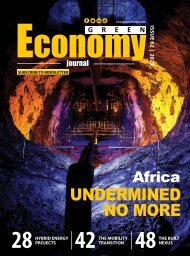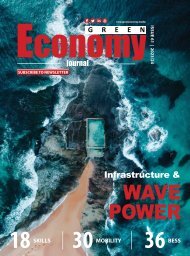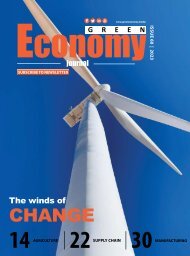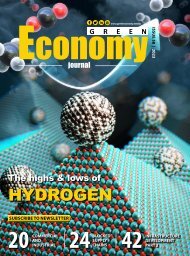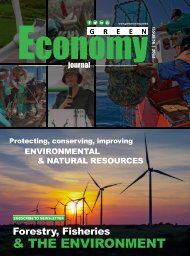+IMPACT MAGAZINE ISSUE 21
You also want an ePaper? Increase the reach of your titles
YUMPU automatically turns print PDFs into web optimized ePapers that Google loves.
PROJECT<br />
down our existing pest control treatment strategy.” This<br />
action too, became a catalyst for rethinking the gardens:<br />
“There wasn’t an extensive breakaway space, so we added<br />
two external decks and on the landscaping side, chose<br />
to regenerate 20% of the landscaping back to its original<br />
state. We swapped the kikuyu grass for Egoli Granite<br />
Grassland and, weaving through it, created a journey of<br />
smells that links back to Firmenich as a fragrance house.<br />
It’ll have certain scented plants – all labelled – and we’ll<br />
also measure the biodiversity impact over a five-year<br />
period, so there will be some useful data there. It’ll also<br />
be interesting to see what the area looked like before<br />
human inhabitants.”<br />
For recycling, individual desk bins were removed and<br />
central recycling stations established. “Initially,” says<br />
Sams, “there was a little resistance, but soon everybody<br />
realised the benefit in terms of movement, etc. Importantly<br />
too, the consciousness of recycling becomes entrenched.”<br />
That consciousness is considered significant, and at<br />
regular intervals throughout the building, smart meters<br />
communicate internally around indoor air quality, power<br />
and water usage levels, all to create a culture of awareness.<br />
To have happy employees and colleagues enjoying a vibrant<br />
workplace experience is the main success of the project.<br />
“Firmenich wasn’t only focused on the green certification,”<br />
says Mafukuzela. “The firm is committed to sustainability.<br />
For example, it has obligated officially to only using certified<br />
green products for its interior. We repurposed the Existing<br />
Building Performance tool for Firmenich.”<br />
In the office, adjustable Haworth chairs, 100% recyclable<br />
with up to 24% of recycled material, were supplied for all<br />
employees, and the monitors are on adjustable arms for<br />
optimal comfort.<br />
Achieving the GBCSA 6-Star Green Star, which is a<br />
World Leadership rating, was a team effort. “To stick<br />
within the original budget, to achieve this and have happy<br />
employees and colleagues enjoying a vibrant workplace<br />
experience, that was the main success of the project.<br />
But none of this is possible if you don’t have a company<br />
which supports the vision and journey. Firmenich did.”<br />
For Sams, “I envisage a site that has zero impact on the<br />
environment it operates in and maybe, even looking<br />
past that, moving from zero to positive. That’s where my<br />
vision is now, so we’re not only targeting the net-zero<br />
rating across all four categories but net positive. That’s<br />
the journey ahead.”<br />
SERVING THE NATION’S<br />
REQUIREMENT FOR VITAL<br />
CEMENT SUPPLIES<br />
CONSTRUCTION MATERIALS<br />
Even as South Africa’s construction sector struggles through difficult cycles of low<br />
profitability and declining capacity, it needs responsible and sustainable companies to<br />
maintain momentum.<br />
This is the view of AfriSam’s sales and marketing executive Richard Tomes, who<br />
highlights that, after almost nine decades in business, the legacy of AfriSam – a leading<br />
supplier of superior quality construction materials - has been to demonstrate the value<br />
of good corporate citizenship. AfriSam began its journey as Anglovaal Portland Cement<br />
Company in 1934, with a cement plant in Roodepoort.<br />
“The time since then has seen many changes and we are proud to have grown stronger,<br />
with our customers confirming that we are still their preferred choice,” says Tomes. “Even<br />
with the depressed state of the construction sector, our focus on quality and sustainability<br />
means that we can continue to serve the market to world class standards.”<br />
AfriSam has taken a long-term view on quality,<br />
experience and capital investment.<br />
A CONSIDERABLE CONTRIBUTION<br />
Tomes argues that the extensive investment in cement<br />
plants, readymix facilities and quarries over the years laid<br />
the groundwork for AfriSam’s considerable contribution<br />
to the country’s infrastructure. As Anglo Alpha, it<br />
had become a fully vertically-integrated construction<br />
materials business in the 1990s through the strategic<br />
incorporation of aggregate producer Hippo Quarries and<br />
readymix company Pioneer Concrete. When the country<br />
re-entered the international community post-democracy,<br />
the company was acquired by the multinational Holcim<br />
group, further augmenting its access to world-class<br />
expertise and best practice.<br />
“The learnings gained when part of the Holcim group<br />
were valuable in positioning AfriSam where it is today,”<br />
he says. “Our access to global research and the sharing<br />
of technical expertise further enhanced the expertise of<br />
many staff still with the business.”<br />
He emphasises the large capital commitments which<br />
AfriSam has historically made in the country’s productive<br />
capacity. Often located in remote areas due to their need<br />
for limestone deposits, cement plants must be built for<br />
optimal longevity to justify the investment, he explains.<br />
These facilities – such as AfriSam’s Ulco and Dudfield<br />
AfriSam has set the standard in the sector regarding carbon<br />
emissions and broader environmental responsibility.<br />
The company trains and maintains the best skills to<br />
oversee and maintain large and complex plants.<br />
plants – operate not just as production facilities but as<br />
integrated settlements.<br />
“We have been able to serve the nation’s requirement<br />
for vital cement supplies by maintaining entire village<br />
environments at these sites, including schools, houses,<br />
churches and other services,” says Tomes. “These<br />
facilities must be carefully managed and maintained for<br />
sustainability, and to make it attractive for our staff to live<br />
and work there.”<br />
There is also an ongoing commitment to education<br />
and training, to ensure that all plants are professionally<br />
operated and systematically serviced while creating<br />
opportunities for future generations.<br />
Looking further ahead, AfriSam has taken a leading<br />
role in the sector to reduce carbon emissions. Aiming<br />
at producing carbon neutral products, the company has<br />
already made significant progress in offering the market<br />
a range of lower carbon cements. It is also considering<br />
renewable energy sources at some its plants, to reduce<br />
coal usage.<br />
“We will continue to make a positive contribution in<br />
helping South Africa meet its commitments to the relevant<br />
global treaties and conventions on climate change,” he says.<br />
24 POSITIVE IMPACT <strong>ISSUE</strong> <strong>21</strong><br />
POSITIVE IMPACT <strong>ISSUE</strong> <strong>21</strong><br />
25


